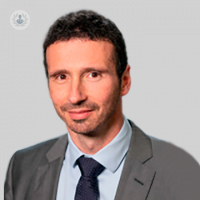Understanding meningioma: Insights and options
Written by:In his latest online article, Mr Pedro Oliveira Castanho gives us his insights into meningioma. He talks about what meningioma is, the causes, how it's detected, if it should be removed, treatment options, the benefits and side effects and the outlook.

What is meningioma, and what are the causes?
Meningioma is a tumour originating from the membranes enveloping the brain and spinal cord. Generally, they are non-cancerous growths, although occasional cases may exhibit more aggressive behaviour. Rarely, malignant forms can occur, particularly in individuals with specific genetic predispositions.
Determining a singular cause for meningiomas proves challenging, as they typically arise from a complex interplay of various factors rather than a singular origin. While hormonal influence, particularly in women, has been suggested, this connection remains incompletely understood. Recognised risk factors include exposure to radiation and the presence of certain genetic conditions like neurofibromatosis type 2, though these represent a minority of cases.
How are meningioma typically detected?
Brain scans may incidentally reveal meningiomas, even before they manifest any symptoms, often occurring during scans conducted for unrelated reasons such as falls or accidents. Patients with meningiomas may present with a range of symptoms, either individually or in combination. These symptoms encompass headaches, epileptic seizures, alterations in behaviour or memory, weakness and sensations in the arms or legs, facial drooping, and double or blurred vision, among others. The absence of specific symptoms for meningiomas highlights the variability, influenced by factors like location, size, and the extent of swelling within the brain.
When should meningiomas be removed?
If there are clear signs of significant symptoms, growth on consecutive scans, or indications of more aggressive behaviour, it may be necessary to consider surgical removal.
What treatment options are available for meningiomas?
Surgery to either remove or shrink the tumour is often advised for the mentioned tumours. Another option is the Gamma Knife, which might be the preferred treatment for certain patients, aiming to prevent tumour growth. In some cases, merely monitoring with regular imaging may be sufficient for managing meningiomas. Currently, there is no medication specifically designed to treat these tumours effectively. However, various medications can assist in symptom control, such as alleviating headaches, managing seizures, or reducing brain swelling. In certain situations, a combination of these treatments and other approaches may be necessary.
Can you explain the benefits and potential side effects of each treatment?
The term "Gamma Knife" might sound misleading because there's no cutting involved. It's a minimally invasive procedure where targeted gamma rays are used on the tumour, minimising impact on the surrounding brain. Despite the unusual idea of using radiation for tumours caused by it, the high dose is precisely aimed at the unhealthy tissue. Usually done in a day and as a single treatment, the procedure might take a few minutes to a few hours. Beforehand, you'll be admitted for necessary investigations.
While generally well-tolerated, common symptoms on the day may include headaches, dizziness, and light-headedness, manageable with later medication. Temporary hair loss and transient brain swelling, also controllable with medication, are potential experiences for patients. Long-term side effects are rare, with exceedingly rare occurrences of radiation necrosis and radiation-induced tumours.
On the other hand, surgery has the potential to cure but is the most invasive option, requiring general anaesthesia. Operations usually go as planned with common post-operative effects like wound pain and swelling. However, there is a small risk of serious complications or death, and the severity of risks varies depending on the tumour’s complexity.
What is the outlook for meningiomas?
Meningiomas are complex tumours that usually need long-term monitoring, no matter how they're treated. The good news is, with the right care, they're often curable or manageable. In these cases, people should be able to lead a regular life and have a normal life expectancy.
Mr Pedro Oliveira Castanho is an esteemed neurosurgeon with over 20 years of experience. You can schedule an appointment with Mr Castanho on his Top Doctors profile.


